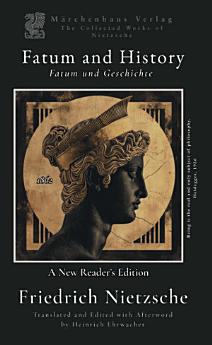Fatum and History: A New Reader's Edition
May 2024 · The Collected Works of Friedrich Nietzsche Book 3 · Marchen Press
Ebook
96
Pages
family_home
Eligible
info
reportRatings and reviews aren’t verified Learn More
About this ebook
This short 1862 essay by Nietzsche is on the Roman concept of "Fatum", which literally means "what has been spoken" and from which the English word "Fate" comes. This is connected to the Greek Spirit called Μόρος or Moros, which drives morals towards death, and shows people their death. The Roman version of the Greek deity Moros was called Fatum. Nietzsche delineates the difference between Fate and the deity-spirit Fatum as: "Free will appears as the unbounded, the arbitrary; it is the infinitely free, the roaming, the spirit. Fatum, however, is a necessity if we are not to believe that world history is a dream, that the unspeakable travails of humanity are imaginary, that we ourselves are the playthings of our fantasies. Fatum is the infinite power of resistance to free will; free will without Fatum is just as inconceivable as spirit without real good without evil. For it is the contrast that makes the quality." Originally titled "Fatum und Geschichte", this was first published in 1862 when he was studying in Pforta. This was published in the journal edited by R.W. Emerson titled "Die Führung des Lebens. Gedanken und Studien" in Leipzig in 1862. This critical reader's edition presents a modern translation of the original manuscript, crafted to help the armchair philosopher engage deeply with Nietzsche's works through clean, contemporary language and simplified sentence structures that clarify his complex ideas. Supplementary material enriches the text with autobiographical, historical, and linguistic context, including an afterword by the translator on Nietzsche’s history, impact, and intellectual legacy, an index of the philosophical concepts he employs—emphasizing Existentialism and Phenomenology—a comprehensive chronological list of his published writings, and a detailed timeline of his life, highlighting the personal relationships that shaped his philosophy.
About the author
Friedrich Nietzsche (1844-1900) was a watershed German philosopher, cultural critic, poet, musician (briefly) and philologist (the study of ancient manuscripts) whose work has had a profound impact on modern intellectual history. Known for his critiques of European morality and religion (particularly Protestantism), Nietzsche's ideas on the "will to power" and the "Übermensch" have influenced a wide range of philosophical, literary, and psychological thought including thinkers such as Martin Heidegger, Albert Camus, Michael Foucault and the entire Postmodern religion.
Rate this ebook
Tell us what you think.
Reading information
Smartphones and tablets
Install the Google Play Books app for Android and iPad/iPhone. It syncs automatically with your account and allows you to read online or offline wherever you are.
Laptops and computers
You can listen to audiobooks purchased on Google Play using your computer's web browser.
eReaders and other devices
To read on e-ink devices like Kobo eReaders, you'll need to download a file and transfer it to your device. Follow the detailed Help Center instructions to transfer the files to supported eReaders.











